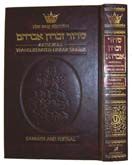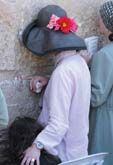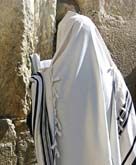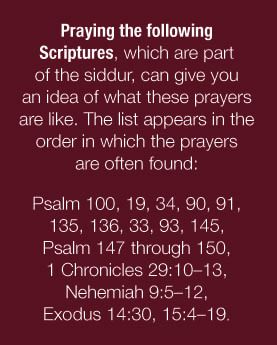×


We have detected your country as:
Please click here to go to the USA website or select another country from the dropdown list.
by: Joanne Gosselin, BFP Staff Writer
 Jewish life follows a cycle. There is a daily, weekly, and annual cycle to life, including prayer life. There are morning prayers, afternoon prayers, and evening prayers. This pattern can be seen when Scripture mentions the times of the Temple offerings. For instance, Psalm 141:2 says, “Let my prayer be set before You as incense, the lifting up of my hands as the evening sacrifice.” Daniel followed this pattern as we read, “Three times a day he got down on his knees and prayed, giving thanks to his God, just as he had done before” (Dan. 6:10 NIV). The Lord instructed His people, saying: “This Book of the Law shall not depart from your mouth, but you shall meditate in it day and night, that you may observe to do according to all that is written in it. For then you will make your way prosperous, and then you will have good success” (Josh. 1:8).
Jewish life follows a cycle. There is a daily, weekly, and annual cycle to life, including prayer life. There are morning prayers, afternoon prayers, and evening prayers. This pattern can be seen when Scripture mentions the times of the Temple offerings. For instance, Psalm 141:2 says, “Let my prayer be set before You as incense, the lifting up of my hands as the evening sacrifice.” Daniel followed this pattern as we read, “Three times a day he got down on his knees and prayed, giving thanks to his God, just as he had done before” (Dan. 6:10 NIV). The Lord instructed His people, saying: “This Book of the Law shall not depart from your mouth, but you shall meditate in it day and night, that you may observe to do according to all that is written in it. For then you will make your way prosperous, and then you will have good success” (Josh. 1:8).
There is a separate set of weekly prayers for the seventh day, Shabbat. There are special prayers for the festivals (moedim) of the Lord. There are also prayer services for the major events of life, including circumcision, marriage, and death.
 What are the actual words of the prayers? They are always focused on the Lord, giving Him praise and honor. Most of the prayers are taken directly from, or are based on, portions of the Tanach (Gen.–Mal.). The morning service begins with the exclamation: “How beautiful are your tents, O Jacob, your dwelling places, O Israel!” (Num. 24:5). Continuing, we are then encouraged to, “Enter into His gates with thanksgiving, and into His courts with praise” (Ps. 100:4). Prayers include a number of psalms that will help lift up even the most downtrodden as they put our focus back on God.
What are the actual words of the prayers? They are always focused on the Lord, giving Him praise and honor. Most of the prayers are taken directly from, or are based on, portions of the Tanach (Gen.–Mal.). The morning service begins with the exclamation: “How beautiful are your tents, O Jacob, your dwelling places, O Israel!” (Num. 24:5). Continuing, we are then encouraged to, “Enter into His gates with thanksgiving, and into His courts with praise” (Ps. 100:4). Prayers include a number of psalms that will help lift up even the most downtrodden as they put our focus back on God.
The Shema is the central prayer in the Jewish prayer book and is often the first section of Scripture that a Jewish child learns. Many Jews recite the Shema at least twice daily: once in the morning and once in the evening. It consists of three parts: the core prayer is from Deuteronomy 6:4–9, the second part is found in Deuteronomy 11:13–21 which describes the blessings that come through obedience, and the final part concerns the use of a tallit or prayer shawl (Num. 15:37–41). Following are excerpts from this beautiful prayer: 
Hear, O Israel: The LORD our God, the LORD is one! You shall love the LORD your God with all your heart, with all your soul, and with all your strength.
And these words which I command you today shall be in your heart. You shall teach them diligently to your children, and shall talk of them when you sit in your house, when you walk by the way, when you lie down, and when you rise up. You shall bind them as a sign on your hand, and they shall be as frontlets between your eyes. You shall write them on the doorposts of your house and on your gates (Deut. 6:4–9).
Yeshua (Jesus) cited this prayer when asked, “‘Which is the first commandment of all?’ Jesus answered him, ‘The first of all the commandments is: “Hear, O Israel, the LORD our God, the LORD is one. And you shall love the LORD your God with all your heart, with all your soul, with all your mind, and with all your strength.” This is the first commandment’” (Mark 12:29–30).
 There are many additional prayers that are blessings or a compilation of different verses combined into one prayer. Other prayers included in the prayer book are from Jewish literature. It may seem that prayers which are read are not meaningful because they are recited, but as in everything, it comes down to the individual’s attitude, heart, and motivations. The Jewish person knows that if prayer is not from the heart (kavanah) and lifted towards the presence of God, then it is just reading and not actual prayer. The Talmud (rabbinic commentary) teaches that “he who prays must direct his heart to heaven.” The siddur is an aid to help one pray with devotion while thinking about the meaning of the words.
There are many additional prayers that are blessings or a compilation of different verses combined into one prayer. Other prayers included in the prayer book are from Jewish literature. It may seem that prayers which are read are not meaningful because they are recited, but as in everything, it comes down to the individual’s attitude, heart, and motivations. The Jewish person knows that if prayer is not from the heart (kavanah) and lifted towards the presence of God, then it is just reading and not actual prayer. The Talmud (rabbinic commentary) teaches that “he who prays must direct his heart to heaven.” The siddur is an aid to help one pray with devotion while thinking about the meaning of the words.
Christians often feel that their prayer life is restricted if they follow a prescribed order. Praying Scripture can actually enhance prayer life because it is a way to listen to what God says, rather than a one-way conversation on our part. Starting out with order does not mean prayer is limited to this one aspect.
 It is always appropriate to offer our thanksgiving, petitions for ourselves and others, as well as all of our concerns. 1 Thessalonians 5:16–18 says to, “Rejoice always, pray without ceasing, in everything give thanks; for this is the will of God for you in Christ Jesus.” Remembering to offer up prayer formally three times a day can be a good way to maintain continual prayer. Now that you know what is in “that book,” you may find yourself picking up a siddur or including some of the psalms and Scriptures in your prayers.
It is always appropriate to offer our thanksgiving, petitions for ourselves and others, as well as all of our concerns. 1 Thessalonians 5:16–18 says to, “Rejoice always, pray without ceasing, in everything give thanks; for this is the will of God for you in Christ Jesus.” Remembering to offer up prayer formally three times a day can be a good way to maintain continual prayer. Now that you know what is in “that book,” you may find yourself picking up a siddur or including some of the psalms and Scriptures in your prayers.
Photo Credit: Shutterstock.com
All logos and trademarks in this site are property of their respective owner. All other materials are property of Bridges for Peace. Copyright © 2025.
Website Site Design by J-Town Internet Services Ltd. - Based in Jerusalem and Serving the World.